From Library Journal
Kincaid here examines the geography and history of Antigua, where she was raised. We first see the island through the eyes of the typical North American tourist, who aims to exchange his or her own "everydayness" for that of someone without the same privilege. But rather than interpret Antiguan experience for outsiders, Kincaid lays bare the limits of her own understanding. She asks us to grasp the crime of empire in a new way, stressing that it can be understood only from a post-colonial point of view: surveying 20 years of a corrupt "free" government, she finds the inheritance of colonialism to be a commercial and governmental enterprise that serves individual interests. Antiguans, she effectively demonstrates, are ordinary people saddled with an unthinkable but unbreachable past. Mollie Brodsky, Rutgers Univ., New Brunswick, N.J.
Copyright 1988 Reed Business Information, Inc.
--This text refers to an out of print or unavailable edition of this title.
Review
"Ms. Kincaid writes with passion and conviction . . . [with] a poet's understanding of how politics and history, private and public events, overlap and blur."-- The New York Times
"A jeremiad of great clarity and force that one might have called torrential were the language not so finely controlled."--Salman Rushdie
"A rich and evocative prose that is also both urgent and poetic . . . Kincaid is a witness to what is happening in our West Indian back yards. And I trust her."--Los Angeles Times Book Review
"Kincaid continues to write with a unique, compelling voice that cannot be found anywhere else. Her small books are worth a pile of thicker--and hollower--ones."-- San Francisco Chronicle
"This is truth, beautifully and powerfully stated . . . In truly lyrical language that makes you read aloud, [Kincaid] takes you from the dizzying blue of the Caribbean to the sewage of hotels and clubs where black Antiguans are only allowed to work . . . Truth, wisdom, insight, outrage, and cutting wit."--The Atlanta Journal-Constitution
"Wonderful reading . . . Tells more about the Caribbean in 80 pages than all the guidebooks."--The Philadelphia Inquirer







